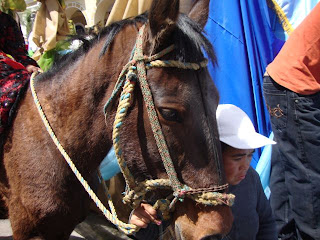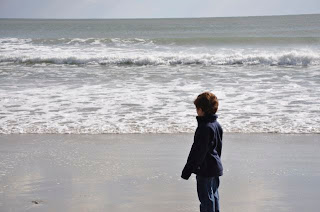The cell phone rang and our building maintenance woman, Nancy, was calling. Her husband, eight year old son, and she wondered if we might like to join them at the Parque Paradiso. Crowding all of us into our car, we drove to the park where we were to meet her sister who is our maid, husband and four children. The Parque Paradiso is the largest park in Cuenca, a city full of parks that are always filled with people.
Just a small section of this huge park
But, Sunday is a special day and Sunday afternoon is when Nancy has her half day off from work. The park was crowded with thousands of people, families of every age but mostly Cuencanos with not another gringo in sight. We walked a good half mile into the park past picnicking families, past swings filled with laughing children, over creeks on swinging bridges, past tents where food was being cooked and sold, beyond a track for sporting events where a horse and buggy gave rides to children, to an area where there was a lake with an island in the center which was home to unusual varieties of ducks and geese and swans. At the side of the lake there was a free concession where a long line of people waited to board paddle boats. It seemed a scene out of a turn of the century photograph.
Cuenca is filled with parks. The rivers that flow through the city are lined with parks with swings, slides, and exercise apparatus every quarter of a mile or so. There are little pocket parks every few blocks in the city with benches and an occasional small paved court for sports. The half dozen large parks compete for the population who arrive on foot or by bus by the hundreds. Spinning carrousels, long slides, jungle gyms, canopy like wire slides, horseback rides, swings, and the almost ever present festival of some sort or the other are the attractions but it is the wide open grassy spaces that seem to bring the families. They arrive in groups of five, ten, or even twenty carrying plastic bags of food and the ubiquitous white futbol. They pour into the parks, stake out a grassy area for games, and place the elderly and children in the shade of some trees.
This Sunday, we were with one of these groups. We met our maid’s family and her cousin’s family and became a group of eight adults and eight children. The small children played around the trees while the older children and adults warmed up with a game of tossing the futbol around a circle.
Warming up by bouncing the ball round the circle
Then teams were created and a lively hour long game of futbol ensued. Goals were created by using a pair of bicycles as one goal and a couple of jackets at the other goal and were manned by a ten year old girl on one side and a mother on the other.
Jonny on the attack
Running, kicking at the ball, often falling but always with laughter and deference to the youngest who played their hearts out, they spent their one afternoon of non-work.
a shot gone astray
The team waiting for the attack
Ishmael with his sights on the goal
After a break for a drink of soda
Nothing like a cold drink on a hot day
and before we left to go home, a rope was hung between two trees for a game of volleyball that lasted until dark.
Once again, we have no message to offer from this delightful Sunday at the park, only the joy and fulfillment we find in our home away from home.
+Bill+and+Loretta.bmp)





















































